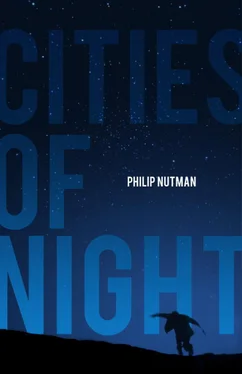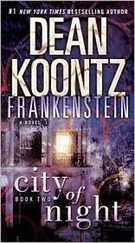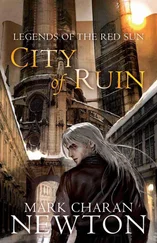Philip Nutman - Cities of Night
Здесь есть возможность читать онлайн «Philip Nutman - Cities of Night» весь текст электронной книги совершенно бесплатно (целиком полную версию без сокращений). В некоторых случаях можно слушать аудио, скачать через торрент в формате fb2 и присутствует краткое содержание. Город: Toronto, Год выпуска: 2012, ISBN: 2012, Издательство: ChiZine Publications, Жанр: Ужасы и Мистика, на английском языке. Описание произведения, (предисловие) а так же отзывы посетителей доступны на портале библиотеки ЛибКат.
- Название:Cities of Night
- Автор:
- Издательство:ChiZine Publications
- Жанр:
- Год:2012
- Город:Toronto
- ISBN:978-1-92685-185-3
- Рейтинг книги:4 / 5. Голосов: 1
-
Избранное:Добавить в избранное
- Отзывы:
-
Ваша оценка:
- 80
- 1
- 2
- 3
- 4
- 5
Cities of Night: краткое содержание, описание и аннотация
Предлагаем к чтению аннотацию, описание, краткое содержание или предисловие (зависит от того, что написал сам автор книги «Cities of Night»). Если вы не нашли необходимую информацию о книге — напишите в комментариях, мы постараемся отыскать её.
Eight cities.
Three continents.
One voice.
From Atlanta to Blackpool, London to New York, from Rome, Italy to Albuquerque, New Mexico via Hollyweird and the city of Lost Angels, all are cities of night.
And the night is forever. Now.
Cities of Night — читать онлайн бесплатно полную книгу (весь текст) целиком
Ниже представлен текст книги, разбитый по страницам. Система сохранения места последней прочитанной страницы, позволяет с удобством читать онлайн бесплатно книгу «Cities of Night», без необходимости каждый раз заново искать на чём Вы остановились. Поставьте закладку, и сможете в любой момент перейти на страницу, на которой закончили чтение.
Интервал:
Закладка:
In truth, the transformation had begun long ago. A summation of desires misaligned, of emotions discarded, left to fracture in the cold expanse of a life misdirected.
Meredith lay between the dream and the desire, comfortable between the sheets of change. Somewhere in his cortex memories skipped like daguerreotypes; flickered, jerked, then faded — fragmented scenes from his childhood, soft-edged with an innocence long lost, revolving one last time. He frowned, then smiled serenely in his sleep of the damned as the dream took shape, wiping the screen of the old, tired images, replacing them with visions of the future. The future inside his body.
Time would be short, but what a time. The fact there would be no laughter, no light, no love didn’t matter anymore. If indeed they had once truly mattered, they seemed now nothing more than trivial concerns, of little consequence to the wider scheme of death within life. That was all behind him. It was easier this way, lack of choice soothing in its streamlined shape. And in the dream a line from a song crept unbidden to provide a momentary soundtrack: Don’t dream it, be it.
He slept on, safe in the knowledge his sisters outside were spreading the gospel to the heathens. All over the world, it would be the same:
One Church, one Body, one Belief.
The Church would welcome fresh converts that night, and there would be new films to watch, new stories to tell, Meredith’s amongst them. In the name of the Father and the Son, the congregation would sing silent praises to the Gods of Flesh and Fluids.
Meredith, after years of searching, finally slept like a newborn baby, his shallow breath rising and falling in a psalm to the rhythm of a deathly desire.
— Rome, 1985; London, 1986. Revised, Atlanta, 2010. For Dario, Fiore and little Asia (who ran away from me).MEMORIES OF LYDIA, LEAVING
Carpenter drains the tenth glass of the evening dry, grimacing as the generous shot of George Dickel scorches his throat.
— Three years —
Three long, lonely years. Years consumed by memories, the recollections as clear yet intangible as the faintest whiff of sour mash. Thirty-six months of sadness. Years when days would suddenly cloud with the thunderheads of feelings past meeting the empty horizon of the present, the persistent pain in his heart temporarily alleviated by a torrent of tears.
Once, not long after she had died, he’d broken down in the street.
A mailman had stopped to ask what was wrong, but the display of concern had only made his condition worse, even if it proved not everyone in New York was a soulless bastard.
— Three years —
Occasional glimpses in the bathroom mirror
— She used to sit in there when she wanted to be alone —
show the lines on his face growing clearer, accelerated by the drinking and smoking, especially on the annual seven-day binges, the third of which he is halfway through, getting steadily shit-faced.
Three years carrying his love of a dead woman around like a ketchup stain on a shirt, not having the strength to do the laundry and try a fresh start.
— Three fuckin’ years —
Lydia had been, for a short time, his everything. Confidante, soul-mate, critic, ardent supporter, lover, nymph, Muse. The Little Woman with the Big Heart. His Heloise, his Isolde, his Guinevere.
— Romantic fool —
His Lydia. His dead Lydia. Dark-haired beauty with an olive complexion, five-two of passion, energy, almost frightening intellect, and a sense of humour Arsenio or Letterman would envy.
— My love killed her, not the razor blade she ran across her wrists —
He pours another shot of Dickel and stubs out a cigarette, immediately lighting another one. The sulphurous bulb of the match gutters in the gloom as he inhales, its acrid aroma temporarily cutting out the smell of the burning scented candles illuminating the room.
— Just the way she liked it —
The first time they’d met she’d beat him to the punch, flicking a Bic as he tugged the matches from his pocket. There was no wind that night, the flame thrusting up towards the tip of the Marlboro, the move as cool as Bogart lighting Bacall’s in “To Have or Have Not,” as he and Lydia stood outside the bookstore on East 19th Street. He asked her to join him for a cappuccino. She agreed, and they sat outside Dojo on St. Mark’s Place watching the street life drift by like human tumbleweed as he got wired on caffeine and she listened to his thoughts on the Escher exhibition at The Psychedelic Solution. She thought the artist’s woodcut entitled Relativity unexciting; he politely argued its merits, lit her cigarette — she smoked Winston Lights — before she could flick the Bic, ordered more cappuccino. She had a Perrier and lime. They smoked and drank until 1:30 AM, neither seemingly wishing to return to their respective apartments, he finally breaking the conversation with a courteous excuse so she didn’t feel he was trying to pick her up. Phone numbers were exchanged; a further meeting suggested. He saw her to a taxi, then walked to his studio apartment on East Seventh Street.
The memory is as clear, as fresh as the wind that suddenly descended that fall night.
She steps gracefully into the taxi, her long black hair spraying out like the demure gesture of a Japanese maiden opening a paper fan. A delicate smile spreads across her lips, the dark brown eyes catching the fallout from the overhead lamps, refracting the yellow-white in a warm, sensual glow. A fog of taxi exhaust slides around her legs like a loyal dog as she climbs in, closes the door, and, with a small wave, is gone.
His life has been running down like an old clock since the day she died. He knows it but doesn’t care. There is no point anymore.
— Tonight it ends —
The glass is dry, the bottle of Dickel almost empty.
He pads barefoot to the refrigerator, plucking a Heineken from the six-pack he’d bought a couple of hours ago. It isn’t Dickel, but beer is booze. He slouches back to the desk, gazing with the eyes of a love-sick school boy at his favorite photo of Lydia.
He’d taken the picture on their short visit to Niagara Falls in the spring after that fateful fall. Along with his painting, his photography gave him pleasure nothing else came close to. Except Lydia. She had freed his soul from the labyrinth of loneliness. Their intimacy was more than sex; they were soul mates.
After making love to her the first time, every relationship he’d had seemed indistinct, like a watercolour left exposed to the elements, its pigments running into each other.
Before Lydia, art had been his only passion. Painting led him to another place; the truth behind the lie. But part of him — the nagging voice of self-doubt — questioned his talent. If he had the soul of an artist, why was he a bank teller? Why didn’t he throw in his job?
— Because I’m afraid; I’ve always been afraid —
His soul screams out for expression but the Nine-to-Five Man inside laughs at the pile of unfinished oil paintings stacked in the corner of the room.
— Call yourself an artist? You’ll never be a Monet or a Van Gogh. Let alone a Keith Haring. —
But tonight he would bring his work to its logical conclusion. No more continuing to labour at the EuroAmerican Bank on Park Avenue South, a junior teller processing other people’s pay checks by day, trying to paint in the evenings, attempting to capture the essence of the world around him, drinking himself into oblivion to numb the pain because all he can see is emptiness and death.
If all life leads to is death, then let it end now. The photograph:
Lydia is dressed in a blue sou’wester with hood, her hair, that luxurious cascade of black, neatly tucked away. Behind her the water thunders down in a heavy drape, precipitation filling the air like the gossamer clouds of a dream. A head and shoulders shot, her pert breasts jut against the plastic, a promise of the flesh beneath the synthetic cover; temptation at the bottom of the frame.
Читать дальшеИнтервал:
Закладка:
Похожие книги на «Cities of Night»
Представляем Вашему вниманию похожие книги на «Cities of Night» списком для выбора. Мы отобрали схожую по названию и смыслу литературу в надежде предоставить читателям больше вариантов отыскать новые, интересные, ещё непрочитанные произведения.
Обсуждение, отзывы о книге «Cities of Night» и просто собственные мнения читателей. Оставьте ваши комментарии, напишите, что Вы думаете о произведении, его смысле или главных героях. Укажите что конкретно понравилось, а что нет, и почему Вы так считаете.












